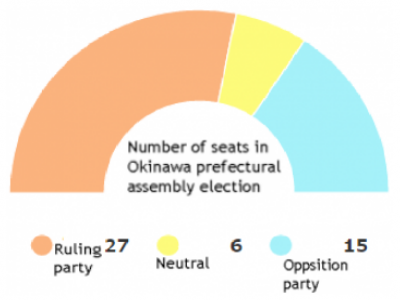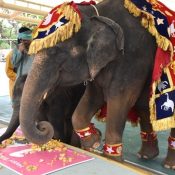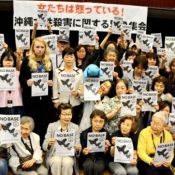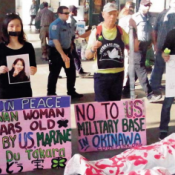Top News

June 6, 2016 Ryukyu Shimpo
By Yukito Toyama
On June 5, in the Okinawa prefectural assembly election, the ruling party which Governor Takeshi Onaga leads, maintained a majority, increasing three seats from 24 in the pre-election.
It was the first assembly election for Governor Onaga, who has been opposing the construction of a new U.S. base in Henoko, since he took the office in December 2014.
The result of the election shows that the public supports the ruling party’s opposition to the Japanese and United States’ governments’ plan to relocate the U.S. Marine Corps Air Station Futenma in Ginowan to Henoko, Nago. The ruling party’s win will create momentum for the Onaga administration to move forward with its policies, knowing it has been given a vote of confidence by the prefectural people.
Before the election, the ruling party had a narrow majority in parliament. Onaga said his government made it a high priority to win a sustainable majority.
However, the ruling party was concerned that too many candidates from its side ran for seats, which could detract from their chances.
Three key officials in the Onaga administration assisted the candidates belonging to the ruling party.
Vice Governor Mitsuo Ageda said there was a sense of crisis, saying, ” If we were to lose a majority, we would face serious difficulty, not being allowed to continue working against the Henoko relocation and even carry out our routine work.”
After the election was declared, Governor Onaga went to the streets almost daily in support of candidates from an organization called “All Okinawa”, which opposes the construction of a new base in Henoko.
Amid growing protests in the wake of the suspected murder of an Okinawan woman allegedly by a U.S. military civilian base worker, who is a former marine, the candidates who oppose the U.S. military presence in Okinawa gained support from voters.
However, the “All Okinawa” coalition will need to reunite after candidates competed against each other, waving their own political party flags. Two candidates belonging to Shimpu-kai, a conservative group in the Naha city council, which gave rise to the Onaga administration and has become something of a symbol of the “All Okinawa” movement, lost seats. Their loss may create ill feeling in the organization.
The number of seats gained by the opposition party was 15, including 14 seats won by the LDP and one by a conservative independent.
The LDP endorsed two candidates in Okinawa and Ginowan districts respectively, catching the momentum of a victory in the Ginowan mayoral election in January. However, the LDP did not increase its seats, with Onaga’s ruling party winning the two seats in Ginowan.
In other districts, the LDP lost some seats.
The LDP’s Okinawa branch has a policy of using every measure possible to enable the plan to relocate the Funtenma airfield to Henoko. Incidents involving U.S. military bases and personnel made the LDP’s candidates less attractive to voters.
The result of the election has forced the LDP to reorganize itself and reconsider its approach for the next elections.
(English translation by T&CT)
Go to Japanese
June 1, 2016 Ryukyu Shimpo
At a Cabinet meeting on May 31, the Japanese government prepared a basic plan to promote the collection of remains of war dead and decided to engage in a policy to promote the collection of remains both within Japan and abroad. According to the basic plan, the Ministry of Health, Labor and Welfare (MHLW) will begin a large-scale effort to collect remains in Okinawa, including from caves and from within U.S. bases. This appears to be the first time the MHLW will collect remains from within U.S. bases.
According to the plan, intensive collection of remains will be carried out during a period starting this year and lasting until fiscal 2024. From now until the next year, intensive collection of documents and site surveys will be carried out in public archives around the world, after which the collection of remains will begin. Based on the Cabinet resolution, the Ministry of Foreign Affairs (MOFA), Ministry of Defense (MOD), and other government ministries and agencies will also cooperate with the efforts.
The plan stipulates that in the efforts to collect remains, the MHLW’s efforts will fulfill “the government’s important obligation to recover a large number of remains quickly, send them back to Japan, and pass them over to the families of the deceased.” Regarding Okinawa, the plan states that the government will “carry out site surveys and collect remains after acquiring accurate information through document research and cooperation with civic organizations.” The government will conduct site surveys and collect remains from inside U.S. bases after receiving permission from the United States. DNA gathered from the collected remains will be put into a database. Even when no articles are found on the remains, unit records and other documents can in some cases assist in identification. In those cases, families and other relatives will be called upon and DNA tests will be conducted to identify the remains with certainty.
How dedicated is the government?
Battle of Okinawa remains collection volunteer (“Gamafuya”) Takamatsu Gushiken speaks:
I have never heard of a large-scale project to collect remains from within U.S. bases. In that sense, this represents some progress.
However, some aspects remain unclear, such as whether they will also collect remains of civilian residents. They say that they will get permission from the U.S. military, but I wonder how serious the government really is about the plan. This is something the government neglected to do after the war. If there are now laws in place and they plan to proceed based on a Cabinet legislation, I want to see them proceed with consideration toward the deceased and their families. In doing DNA tests, they plan only to test the teeth, but I want to see them test the bones of the hands and feet as well, which are more likely to produce DNA.
(English translation by T&CT and Sandi Aritza)
Go to Japanese

May 31, 2016 Ryukyu Shimpo
On May 22 the 16th birthday party of popular Indian elephant Ryuka was celebrated at the Okinawa Zoo & Museum in the Goya district of Okinawa City. Children and parents who attended the party, sang the “Happy Birthday” song to help her celebrate. Ryuka, who performed tambourine and harmonica to music, appeared to be in a chipper mood. Ryuka and her daughter Ryubi ate cakes made of fruits and sweet potatoes, pleasing the crowd.
The zoo staff quizzed the audience about the growth of Ryuka, which entertained them. Ryuka currently weighs 2400 kilos. She is 20 years old in human age.
Five-year-old Kotone Miyamori and her brother 2-year-old Kazuma attended the park with their parents and said that they love the elephants, and enjoyed celebrating Ryuka’s birthday.
(English translation by T&CT)
Go to Japanese

May 30, 2016 Ryukyu Shimpo
On the night of May 25, local divers confirmed that coral spawned in Tokashiki Island. This occurs once during the period from May to July each year.
Around 10:20 p.m., staghorn coral and Montipora spawned at the same time, which illuminated the dark ocean. Divers and other visitors enjoyed the scene. Coral laying eggs was confirmed one week earlier than the last year.
Yuriko Nishiura who runs a diving shop in the Tokashiki district, said, “I am moved every time I see the coral spawning. Pink colored eggs were ejected from the front edges of the coral, which colored the dark ocean. I felt as though I was in front of the universe.” A couple visiting from Kanagawa Prefecture, who have been to Tokashiki for holidays every year for 10 years, were impressed to see coral laying eggs for the first time.
(English translation by T&CT)
Go to Japanese
June 3, 2016 Ryukyu Shimpo
The Okinawa Prefectural Government (OPG) has conducted a survey on usage of a public wireless network (WiFi) in accommodation facilities and tourist spots in Okinawa, including looking at Internet usage of foreign tourists. According to the survey, 89.6 percent of accommodation facilities have installed WiFi while only 30.9 percent of tourist spots have WiFi services. Thirty percent of foreign tourists answered “Satisfied” with WiFi services. The most common reason for dissatisfaction was, “There are few WiFi spaces, or it is unclear if WiFi is available.”
OPG conducted a questionnaire survey in 97 tourist spots and 356 accommodation facilities (a total of 435 facilities) in Okinawa from November 16 to December 18, 2015. They analyzed the log of WiFi and GPS.
Regarding language, 42 percent used English, 23 percent used traditional Chinese, which is mainly used in Taiwan and Hong Kong, 19 percent used simplified Chinese, which is used in mainland China, and 5 percent used Korean. Meanwhile, 84.3 percent of foreign tourists used Internet services.
Among the people who are interested in using WiFi, 66.9 percent answered that they could not use it at a place they wanted to use it. The most common place for using WiFi was at hotels and accommodation, which had 87.7 percent, the next most common in order were Airport, Port, Bus stop, and station, which showed 44.4 percent. The most common place where tourists could not use WiFi was tourist spots, which got only 26.3 percent.
The OPG has made a start on a prefectural-wide WiFi free service in order to improve convenience for foreign tourists.
Starting on July 1, Okinawa Cellular will release 5,700 free WiFi connection spots, previously only for those on an AU contract.
(English translation by T&CT and Megumi Chibana)
Go to Japanese

May 27, 2016 Ryukyu Shimpo
Groups of congressional representatives and organizations advocating for the eradication of sexual violence held a rally under the title “Women are mad! Emergency Session on Murder of Okinawan Woman” on May 26 at the congressional office building for the House of Councilors in Tokyo. Participants protested against the Japanese and U.S. governments in solidarity with Okinawa regarding the recent alleged murder of an Okinawan woman by an ex U.S. marine. According to the group organizer, 300 people took part in the rally.
The participants agreed on the statement read out at the meeting. The statement criticized both the U.S. and Japanese governments for their U.S.-Japan summit meeting held on May 26, stating that “there was not even an apology for the loss of this irreplaceable life, and the attitude they show is far from sincere in offering solutions.” The group further demanded for removal of the U.S. military bases in Okinawa.
A member of the Upper House, Keiko Itokazu, strongly pleaded for revision of the Status of Forces Agreement (SOFA) on the stage stating that “as long as there is the SOFA, which is unequally designed, we will not be able to do anything but shed tears over how many Okinawans have been murdered. Even though we strongly and repeatedly demand the revision of SOFA to the Japanese government, they have not made any effort to listen to us.”
A writer, Keiko Ochiai, said, “Including the latest unforgivable incident, all the continuing issues surrounding Okinawa ask those of us who live outside of Okinawa, ‘where do you stand?’.” She argued that people living outside of Okinawa need to take this into serious consideration.
(English translation by T&CT and Sayaka Sakuma)
Go to Japanese
June 1, 2016 Ryukyu Shimpo
The National Association of Chairpersons of City Councils adopted a resolution requesting a drastic revision of the Status of Forces Agreement (SOFA) at a meeting held in Tokyo on May 31.
The organization represents over 800 chairpersons of city councils. The association will lobby the government to revise the SOFA.
Minoru Yabiku, the chairperson of the Nago City Council, explained the purpose of the resolution, referring to the recent death of an Okinawan woman whose body was allegedly dumped by a former U.S. marine,
Yabiku stated, “Only improving administration of the Status of Forces Agreement will not help deter recurrence of incidents and accidents involving U.S. military bases. It is necessary to revise the agreement drastically. ”
He expressed his strong anger, saying, “The young woman, whose body was dumped, was victimized just when she was about to chase her dreams. It is a matter of the greatest regret to us because we could not protect her life. Okinawan people are furious with rage.”
Similar resolutions have been periodically circulated by the National Association of Chairpersons of City Councils. They have been submitted every year since 2013 because incidents and accidents caused by U.S. service members and civilian workers have not stopped. This is the sixth time at least.
(English translation by T&CT)
Go to Japanese
May 31, 2016 Ryukyu Shimpo
It seems there is a problem surrounding the Abe administration’s insistence on exercising sole authority over diplomacy, as the U.S. continues to exercise its own authority over Japan’s sovereignty, and the lives of citizens residing around military bases continue to be threatened.
Many citizens have made apparent their sentiments that Japan’s servility to the U.S. has borne this twisted state of affairs, which must be changed.
In a nationwide public opinion poll concerning the U.S. Forces Japan (USFJ)’s legal status under the U.S.-Japan Status of Forces Agreement (SOFA), conducted jointly by a few news agencies, 71 percent of respondents said the SOFA should be revised. The Abe administration should sincerely respond to the voices of Japanese citizens, and step forward to engage in negotiations with the U.S. to drastically change the SOFA. Not requesting the revision has led nothing to change up to the current situation.
The incident of a woman’s body being dumped after an act of violence by a U.S. military base employee has not only strengthened demand for revision of the SOFA within Okinawa, but has had a similar effect on the whole country.
Prime Minister Shinzo Abe did not make a request for revision of the SOFA to President Barack Obama at the U.S.-Japan Summit Conference, and avoided coping with the topic throughout the conference. Obama was in agreement with Abe, saying that Abe has been showing improvement in implementation of the SOFA without actually amending it. However, Obama did not even mention an example of how Abe is improving this implementation; his statement entirely lacked concrete evidence. If they do not plan to revise the SOFA, all they can do is evade the topic.
We can no longer permit the Japanese government to repeatedly fail to respond to requests for revision of the SOFA every time they are brought up in reaction to a U.S. military-related incident.
The Abe administration appears to be waiting for Okinawans’ anger to dissipate, but is not grasping the nationwide public opinions on these issues. Criticism against the diplomatic approach of willingly obeying the U.S. is growing stronger.
As the U.S. military continues freely to operate bases in Okinawa to its preference, it does not concern itself with the human rights and living circumstances of residents living around the bases, making victims of them.
Examining the results of the public opinion poll, even among Abe’s supporters 67 percent say that the SOFA should be amended. Among those who are not Abe supporters this opinion reaches 81.9 percent. Of supporters of the ruling party (the LDP) 65.7 percent think the SOFA should be amended, and Komeito supporters agree at 75.5 percent. These numbers indicate that this is a widespread opinion.
Military personnel, civilian employees of the bases, and U.S. military members have been given a sense of privilege under the U.S.-Japan SOFA. When incidents occur off-base and outside of official business, perpetrators can escape back onto the base without being turned in to Japanese authorities, except for instances of brutal crimes.
When U.S. bases are returned and pollution is found on the land, the U.S. is not even imposed with the obligation to clean it up. With Japanese subservience to the U.S., we hesitate to even call Japan a sovereign nation. Now that 71 years have passed since the end of the war, this strange and continuous state of affairs has gotten out of hand and should be severed at last.
(English translation by T&CT and Erin Jones)
Go to Japanese
May 29, 2016 Ryukyu Shimpo
On May 28, Lieutenant General Lawrence Nicholson, Okinawa Area Coordinator for the U.S. military and the top official of the U.S. forces in Okinawa, spoke to Governor Takeshi Onaga by telephone. Lieutenant General Nicholson announced to Governor Onaga that in the wake of the arrest of a U.S. military employee for disposing of a woman’s body, the U.S. military in Okinawa have implemented new measures banning late-night excursions and alcohol consumption off base. Onaga said that he acknowledged Nicholson’s sincerity, but added, “The fundamental problem is that 74 percent of facilities designated for exclusive use by the U.S. military in Japan are located in Okinawa, which only makes up 0.6 percent of Japan’s land mass. Any discussion of a reduction of burden must include a discussion of revising the Status of Forces Agreement,” expressing his intent to pay close attention to how the U.S. deals with the situation.
Governor Onaga spoke to the press after the telephone conversation with Lieutenant General Nicholson. According to Onaga, in response to the fact that Onaga was unable to meet with U.S. President Barack Obama to convey Okinawa’s position despite having asked Prime Minister Shinzo Abe to arrange such a meeting, Nicholson said he would like to create opportunities for Okinawan sentiment to be conveyed to U.S. military leadership. Onaga asked Nicholson for his assistance in creating such opportunities.
Regarding Nicholson’s explanation of the new measures put in place by the U.S. military in Okinawa, Onaga said, “People in Okinawa have protested hundreds of times for decades since the end of World War II. I accept [Nicholson’s] sincerity, but unfortunately, I think that the Okinawan people do not have much confidence that [the measures] will lead to the prevention of recurring crimes.”
(English translation by T&CT and Sandi Aritza)
Go to Japanese
May 23, 2016 Ryukyu Shimpo
Regarding the recent arrest of a U.S. military employee on suspicion of disposing of a woman’s body, “All Okinawa Kaigi”, a community organization that aims to prevent the construction of a new base in Henoko, held an emergency meeting on May 22. The organization’s members decided to hold a protest rally in June.
They will do so in a bipartisan way. According to a key person involved, the rally is scheduled to be held on June 19. Considering that the rape of an Okinawan schoolgirl by US military personnel in 1995 sparked a huge anti-base rally, the organizers expect the same size protest. They will look for a venue accordingly
(English translation by T&CT)
Go to Japanese

May 28, 2016 Ryukyu Shimpo
By Sakae Toiyama in Washington, D.C.
On May 26, in Washington, D.C., ‘CODEPINK’, a women’s group seeking peace and social justice, held a protest after an Okinawa woman was allegedly murdered by a U.S. civilian base worker, who is a former U.S. marine.
Members demanded removal of U.S. bases from Okinawa in silent protest, holding placards saying “NO TO U.S. MILITARY BASE IN OKINAWA”.
They expressed their deep anger and sorrow, holding portraits of the victim. Some of them held a ‘die-in’ protest, covering themselves in mock shrouds painted with fake blood.
Alice Kurima Newberry, a member of CODEPINK, whose mother is from Okinawa, planned the action.
Newberry said, “This sorrow and anger can’t be expressed in words. We want U.S. citizens to understand what has happened so far in Okinawa.”
Members of citizens groups, including Veterans for Peace, Steve Rabson, a professor emeritus at Brown University and an advocate of intellectuals opposing construction of a new U.S. base in Henoko, and Stephanie Ortoleva, a human rights lawyer and the president of Women Enabled International, took part in the protest action.
Newberry sealed her mouth with black tape, as a symbol of Okinawan people’s voice not being heard by the U.S. citizens and the government.
Mark Kurita, 55, a resident of Washington, D.C, said he was shocked by the news of the incident. He said, “It is a tragic incident. Why do the marines continue to stay on Okinawa? I was disappointed in President Obama because he did not turn his eyes to this issue.”
Rabson said the governments of Japan and the United States should take action and listen to the voice of Okinawa. He added that only apologizing would not help resolve the issue.
Ortoleva stressed that there was no other way but to withdraw U.S. troops from Okinawa because violence against women can happen wherever U.S. bases are located.
(English translation by T&CT)
Go to Japanese





 Webcam(Kokusai Street)
Webcam(Kokusai Street)


